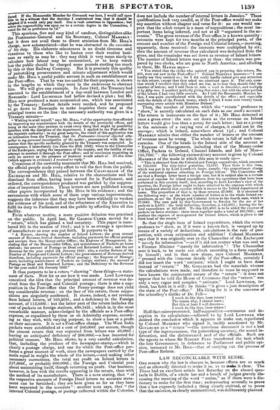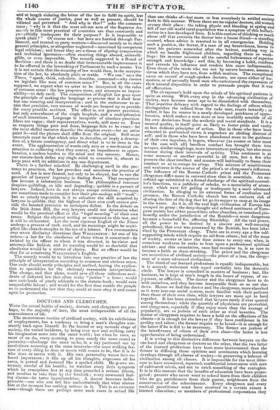LAW RECONCILABLE WITH SENSE.
Orin reason why the law is obscure is, because efforts are as muck and as allowedly directed to make it so, as to make it clear. The Times had an excellent article last Saturday on the absurd spec- tacle in Dublin, of a whole bar and a bench of judges gravely dis- cussing the meaning of the word "assize," as if there were a dic- tionary to make for the first time; endeavouring severally to prove- that a law expressly included a thing clearly omitted, or to prove that the omission, as clearly unintentional, was deliberately planned and at length violating. the letter of the law to fulfil its spirit, lest the whole course of Justice, past as well as present, should be
vitiated and perverted. "And why is this?" asks the commen- tator; " why is it that the most solemn acts of the Supreme As- sembly in this most practical of countries are thus constantly and proverbially inadequate for their purpose ? Is it impossible to speak plain ? " Of course not : but laws are hurried through Par- liament, and treated as party matters—discussed merely as to their general principles, or altogether neglected—unrevised by competent legal criticism; and hence they are a tissue of slipslop composition
and technical ignorance—often enacting things absurd, unintelli- gible, or even impossible. The remedy suggested is a Board of Revision : and there is no doubt that immeasurable improvement is to be effected in the lawmaking of Parliament by such a means. Yet it is not certain that the meaning of law would then, in the accepta- tion of the law, be absolutely plain or stable. "We can," say s the Times, "speak, think, calculate, describe, command—why cannot we legislate like men of common sense ?" But, in all the cases supposed, we expect what we utter to be interpreted by the rules of common sense : the law proposes more, and attempts an impos- sibility—to defy cavil. The composition of English law goes upon the principle of making the language so precise that it shall bear but one meaning and interpretation ; and in the endeavour to at- tain that precision, vast masses of words are heaped up to provide for every possible accident. The effect is, not greater precision, but only concealment of the single loophole, and a multiplication of such interstices. Language is incapable of absolute precision. Ideas are vague; their representatives, words, still more so. Even as respects things past and done, language fails to be exact : let the most skilful narrator describe the simplest event—let an artist paint it—and the picture shall differ from the original. Still more uncertain must be that which tries to describe, or imply a descrip- tion of, a future contingency, and direct what is to be done in the event. The agglomeration of words only acts as a mechanical ob- struction to collecting what they convey, an impediment to appre- hension, a useless burden to the mind and the memory. Hence, our statute-book defies any single mind to conceive it, almost to keep pace with its additions in any one department.
There is a further mischief. By challenging cavil in the pre- tence to precision, the law provokes and sanctions the practice of cavil. A law is now framed, not only to be obeyed, but to run the gauntlet of lawyers' ingenuity in finding flaws. That occupation has become a substantive business. The philosophical reasoner despises quibbling, as idle and degrading ; quibble is a pursuit of lawyers. Indeed, laws do not always escape criticism ; attempts are sometimes made to consider how their phraseology will " work" : but so utterly impossible is it to calculate the skill acquired by lawyers in quibble, that the highest of their own craft cannot pro- vide the boasted precision to anticipate defeat. In the debate on the Irish Arms Bill, the very lawyers could not determine what would be the practical effect or the "legal meaning" of their own terms. Subject the clearest writing or command to this test, and it will be obfuscated. Let the most vigorous English of the Times undergo a process of such cavil, and its meanings might be multi- plied like church-steeples in the eye of a lobster. Few commanders ever wrote distiocter directions than WELLINGTON: let one of his orders—a law for the obedience of those whom it concerned—be twisted by the officer to whom it was directed, in barrister and attorney-like fashion, and its meaning would be so doubtful that obedience would be a matter of choice. But an officer would be shot for so construing WELLINGTON'S English. The remedy would be to introduce into our practice of law the principle of interpretation according to common and obvious sense. Our code should settle principles and method, leaving the applica- tion to specialties for the obviously reasonable interpretation. The change, and that alone, would save al those ridiculous acci- dents of defeated law that often make "justice" a farce ; would save cart-loads of yearly addenda to the statute-book ; would save unspeakable labour ; and would for the first time enable the people so to understand the law that they could at once obey it and count upon its protection.



























 Previous page
Previous page